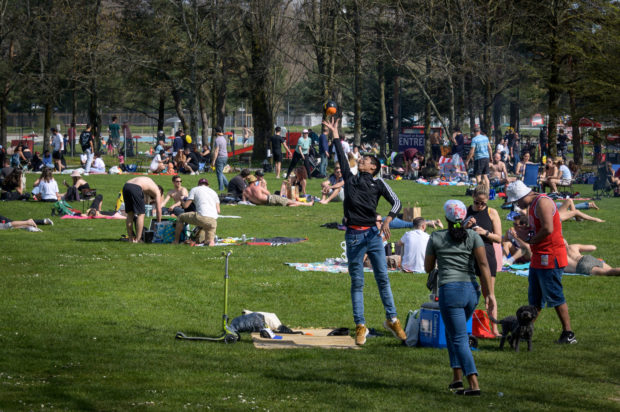
People enjoy a warm spring day on the edge of Lake Geneva in Lausanne on April 2, 2021, amid the Covid-19 pandemic. (Photo by Fabrice COFFRINI / AFP)
GENEVA — Alpine neighbors Switzerland and Austria on Wednesday became the latest European countries to drop almost all of their Covid-19 restrictions despite the virus still circulating strongly.
The Swiss government said the conditions were right for a “rapid normalization” of national life.
From Thursday, the only remaining coronavirus requirements in Switzerland will be the obligation to self-isolate for five days after a positive test, and to wear masks on public transport and in healthcare institutions.
However, those rules will expire at the end of March at the latest.
“The Federal Council took the decision to lift the majority of measures in place to contain the coronavirus pandemic,” the government said in a statement.
“Masks and Covid certificates will no longer be required to enter shops, restaurants, cultural venues and other public settings and events.
“The requirement to wear masks in the workplace and the recommendation to work from home will also end.”
Austrian Chancellor Karl Nehammer said the government would drop most measures from March 5.
Only mask wearing in essential shops and public transport will remain compulsory, as well as entry restrictions at hospitals and other places with vulnerable groups, he added.
“The outlook shows us that together we can cautiously and prudently but with determination take back the freedom that the virus took,” Nehammer told reporters.
“From March 5, most of the restrictions that are burdening people will be lifted.”
Nehammer warned that the pandemic was not over yet, adding “coronavirus is still part of our lives” and that vaccination “remains important”.
Switzerland and Austria will thus join European countries including the UK, Netherlands, Denmark and Norway in dropping most restrictions.
“Thanks to the high level of immunity among the population, it is unlikely that the healthcare system will be overburdened despite the continued high level of virus circulation,” the Swiss government said.
“This means that the conditions are in place for a rapid normalization of social and economic life.”
To get into Switzerland, it will no longer be necessary to provide proof of vaccination, recovery or a negative test, or complete an entry form.
Though Covid passes are being dropped domestically, Switzerland will still issue vaccination/recovery certificates that are recognized by the surrounding European Union.
Restrictions on large-scale public events and private gatherings are also being dropped from Thursday.
This month Austria became the first EU country to make coronavirus vaccination mandatory. The law, stipulating fines from mid-March for those who refuse to get jabbed, took effect on February 5.
Nehammer said the government is setting up a commission of health and judicial experts to evaluate the law before penalties are imposed given the new opening up of restrictions.
Switzerland has registered more than 2.6 million Covid-19 cases and over 12,500 deaths during the pandemic while Austria has recorded more than 2.3 million cases with more than 14,400 deaths.
The vaccination rates are almost identical with Switzerland at 70 percent and Austria at 69 percent.

